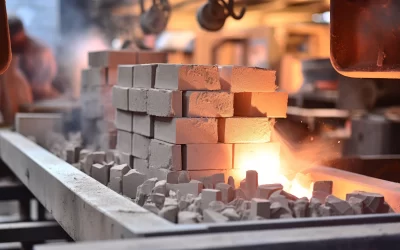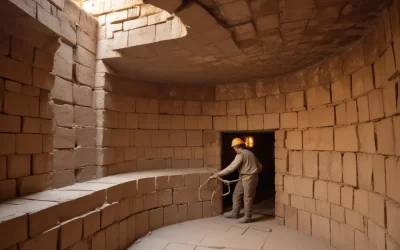Refractory materials have generally played an important part in the manufacture of raw iron and steel for lining metallurgical vessels. Although they were formerly almost entirely meant to secure the steel casings of the vessels, they must now be regarded as an integral element of the melting process.
They are used in the transport and pre-treatment of hot metal, direct reduction modules, blast furnaces, batteries for coke ovens, oxygen converters, steel ladles, recirculation degassers, electric furnaces, casting systems, tundish, heat treatment units, heating furnaces, and other downstream equipment.
Modern refractory technology is no more primarily based on material qualities. Heat modeling, optimum process, furnace design, liner installation, and furnace operation are all technologies that have evolved. The advancement of refractory technology paralleled advancements in iron and steel manufacturing techniques.
Although the term “refractory” accurately defines the major refractories, which are willing to contain substances at extreme heat, refractories are a diverse group of materials that possess property to differing extents, over varying time periods, and under varying conditions of use. Refractory compositions are available in a wide range of sizes and dimensions, and we have employed them in a broad spectrum of applications.
Refractory Solution In Glass Industry
In its furnaces, the glass industry is primarily concerned with heat and chemical assaults. This will have a negative influence on the furnace’s superstructure. As a consequence, the glass industry suffered significant harm.
Hence, always use the best refractory material to avoid any harm. Such as the breakdown of the furnace liner by heat and chemicals. In addition, select qualified refractory lining contractors. As an end, it will not subject your glass operations to excessive heat variations, which will have an impact on the quality of the glass.
Refractories For Aluminium Industry
Refractory contractors are frequently relied upon to install refractory materials for the aluminum sector. Refining, melting, treating, and processing aluminum products and trash are all examples of aluminum processes. As a result, these furnaces require the appropriate refractory materials for each stage. Because aluminum has a high affinity for oxygen, the potential reactions may result in corundum at the exterior lining. As a result, this sector is heavily reliant on high-quality refractory bricks for the long-lasting refractory lining.
Refractories For Lime Industry
Lime burning techniques essentially involve turning limestone into calcium oxide and carbon dioxide. As a result, high-performance refractory linings are required for equipment such as shaft & rotary kilns . The preheating, cooling and burning zones may all be securely managed with the correct refractory design. Overall, the strong refractory solutions can keep lime production at its peak.
Refractory Uses Iron & Steel Industry
The iron and steel manufacturing industry is the nation’s biggest user of refractory materials, contributing to almost two-thirds of total refractory manufacturers. From basic to secondary steelmaking processes, there is a wide range of vessels available for the larger units, such as the electric arc furnace, and blast furnace as well as the more maintenance-intensive components, such as tapholes, launders, and submerged entry nozzles.
Refractory Employ In Refineries, Petrochemicals & Chemicals
Refractory castables are required in refineries, chemical facilities, and petrochemical plants. This is to ensure that the hydrocarbon operations are not disrupted. The correct methods can lower the rate of refractory lining consumption. Fired catalytic reactors, heaters, sulphur burners, and gasifiers are examples. Similarly, similar facilities must make plans to reduce their operating costs and carbon footprint. As a result, they require refractory lining stability over a lengthy period of time.
Refractories In Power Generation Industry
Refractory installation enterprises have evolved with the power production sector. This is due to the fact that giving any form of electricity to the globe entails several operations. As a result, managing the heat processes necessitates the expertise of a qualified refractory installation contractor. Extraction of energy from coal, for example, necessitates the use of a robust boiler refractory to defend against thermal shocks.
Refractory For Incineration
Suitable refractory linings, especially for waste incineration, can extend the life span and maintenance of the overall plant equipment. In addition, incinerators are subjected to high temperatures and vigorous operations. As a result, effective heat transfers are required in rotary furnaces and combustion chambers. By defending against harsh conditions, the proper monolithic refractory may address this.
Refractory Solution For All…
With the correct use, refractory can enhance any industry. Refractories are classified into several categories. However, extensive preparation and study are required to ensure a productive refractory application.
To attain such requirements, you’ll need the top refractory contractor in India. “Ganeshas” Our refractory solutions are created to order. Based on your specific operations for a long-lasting refractory.




